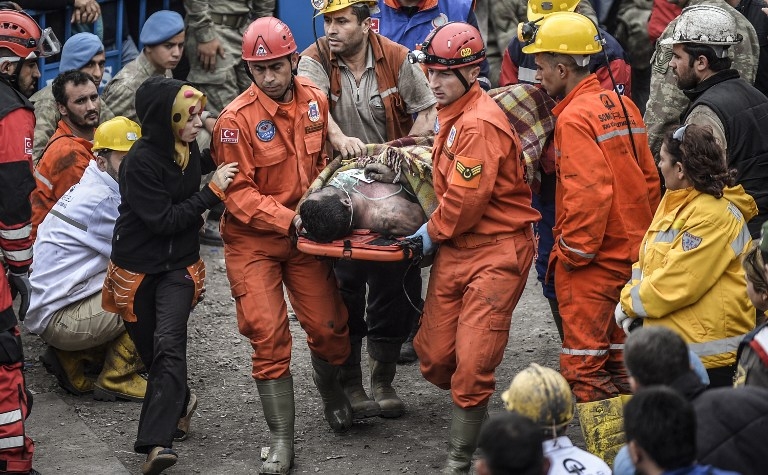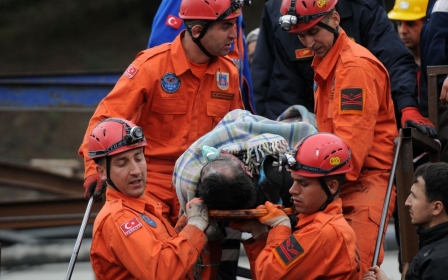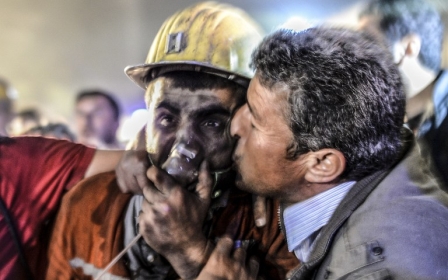Protests erupt across Turkey as mine disaster death toll rises

As hopes began to fade on Wednesday for an estimated 120 miners still believed to be trapped following an explosion in a mine in western Turkey, thousands of protesters took the streets accusing the government and mining industry of negligence. The country's biggest union also announced it would strike Thursday over the catastrophe
On Wednesday evening, Police used tear gas and water canon to disperse between 3,000 and 4,000 protesters in Ankara's downtown Kizilay Square. Riot police also clashed with thousands of protesters in Istanbul who were chanting anti-government slogans as they marched along the city's main shopping street Istiklal.
Earlier in the day, they also used tear gas against around 800 students marching on the energy ministry, and 50 protesters who threw eggs at the mining research directorate in Istanbul, AFP photographers reported.
In the western town of Soma, near the site of the explosion, protesters reportedly attacked the offices of the Prime Minister Recep Tayyip Erdogan's AKP party.
Erdogan arrived in Soma midday on Wednesday to inspect the explosion site. At a press conference following his visit to the mine, Erdogan told reporters, "We have witnessed one of the biggest work accidents in our recent history."
New MEE newsletter: Jerusalem Dispatch
Sign up to get the latest insights and analysis on Israel-Palestine, alongside Turkey Unpacked and other MEE newsletters
At least 274 people are confirmed dead from the explosion, reportedly trigged by an electrical fault, which led to parts of the mine collapsing. The mine's operator said on Wednesday that close to 450 of its staff had been rescued while another 120 miners are still believed to be underground.
Erdogan said enquiries would be launched into the causes of the disaster, but insisted that "such accidents happen".
He also appeared to downplay the seriousness of the accident, comparing it to other mining disasters elsewhere, saying "204 people died in the UK in 1862 and 361 people in 1864".
But hundreds of distraught family and friends gathered near the building where Erdogan gave a press conference were outraged, with some kicking his vehicle and calling for his resignation as he left.
The disaster risks adding to the political pressure on Erdogan, who faced mass protests last summer and a huge corruption scandal involving his family and key allies in recent months.
"If the claims of negligence at the mine prove true, it will have a political price. Such a development would render corruption allegations targeting Erdogan's government more convincing," Professor Ilter Turan of Istanbul's Bilgi University told AFP.
Complicated rescue efforts
Three days of national mourning have been declared, while at the scene of the accident, fires and and toxic gases have complicated rescue efforts, said Energy Minister Taner Yildiz.
"I must say that our hopes about rescue efforts inside (the mine) are fading," he added.
A miner from a different site who joined the effort, Murat Kurkoglu, told AFP: "We will try to save those who are still stuck one by one, but you know very well that there is no more hope. It's finished for them."
It is not clear how many remain trapped in the mine. Nurettin Akcul, head of Turkey's mining union, told AFP there were between 100 and 150 people.
The miners are all thought to have gas masks, but it was not clear how long they would last.
Earlier reports said 787 workers were underground when the blast occurred. By late Wednesday, "close to 450" workers had been rescued, according to the mine operator, Soma Komur Inc, but accounts from rescue workers cast doubt over the numbers.
"There are pockets of air, but it's only a glimmer of hope because so far ... it's mostly the dead that we are bringing out," Erdem Bakin, a doctor with the Search and Rescue organisation, told AFP.
"We don't go more than 100 metres from the bottom of the mine. It's impossible to go right to the bottom because of the risk of asphyxiation from the gas."
Bakin said they found the transformer that exploded, triggering the collapse. Those between the transformer and the entrance of the mine - around 70-80 people - survived.
"But those who were beyond were taken by the fire and they are all dead," he said.
Harun Unzar, a miner at the site, said: "We are a family and today that family is devastated. We have had very little news and when it does come it's very bad."
As victims were taken away on stretchers, friends and relative desperate for news of their loved ones tried to pull away the sheets covering their corpses.
Most sat silently on benches, their faces blank with shock, while others scoured a list of the wounded posted up on a wall alongside the name of the hospital they were taken to.
One young woman, Bahar Galici, stared at the sheet of paper before walking away. "Still nothing," she sighed.
'Tired of funerals'
Explosions and cave-ins are common in Turkey, particularly in private mines, where safety regulations are often flouted.
Turkey's worst mining accident happened in 1992 when 263 workers were killed in a gas explosion in a mine in northern Zonguldak.
A lawmaker from the main opposition Republican People's Party (CHP) said it submitted a parliamentary motion 20 days ago to investigate work-related accidents at coal mines in Soma but it was rejected by the government.
The CHP's Manisa deputy Ozgur Ozel told local media: "We receive tip-offs every day that workers' lives are under threat.
"We lawmakers from Manisa are tired of going to miner funerals."
Tuesday's explosion was believed to have been triggered by a faulty electrical transformer at around 1230 GMT.
Turkey's ministry of labour and social security said the mine had been inspected eight times in the last four years, most recently on 17 March, and was found to comply with safety regulations.
But Oktay Berrin, a miner, said workers were not protected underground.
"There is no security in this mine," he told AFP. "The unions are just puppets and our management only cares about money."
'Heartfelt condolences'
Cemile Dag, a woman in her 50s, said she had been waiting since Tuesday afternoon for news of three relatives trapped underground, including her grandson and her nephew.
"All three were working in the same pit... I couldn't get any news on the telephone so I came here," she said.
Energy Minister Yildiz promised the government would "not turn a blind eye" to negligence. "We will do whatever necessary, including all administrative and legal steps," he said.
The mining company Soma Komur said it had taken maximum measures to ensure safety.
"The accident happened despite maximum safety measures and inspections, but we have been able to take prompt action," it said.
France, Germany and the European Union all offered their condolences and assistance.
"It is with shock that I learned the news of this grave mining catastrophe. Germany is by the side of your country as this difficult time and is ready to help," said German Chancellor Angela Merkel.
Turkey's foreign ministry said: "We don't need any international help for now. We have enough equipment."
Soma is a key centre for lignite coal mining around 250 km south of Istanbul.
Middle East Eye delivers independent and unrivalled coverage and analysis of the Middle East, North Africa and beyond. To learn more about republishing this content and the associated fees, please fill out this form. More about MEE can be found here.




